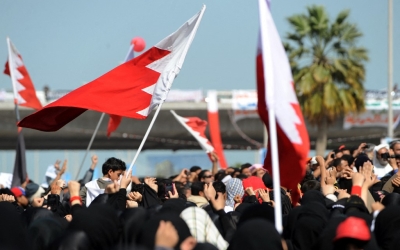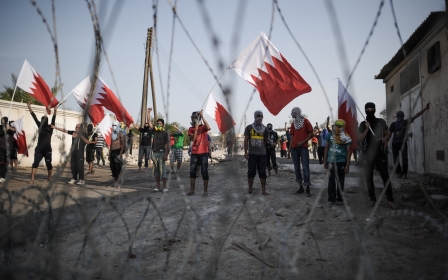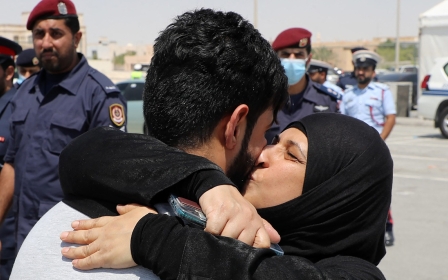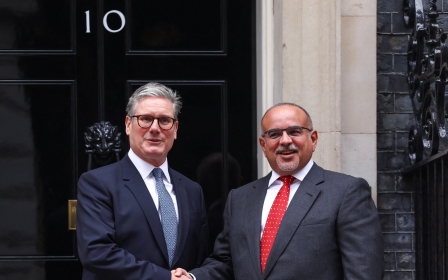UK-backed Bahrain body dismisses concerns for prisoners in illegal detention

Concern is growing for four prisoners in Bahrain who have been illegally placed in solitary confinement following unrest, with a UK-backed body dismissing their relatives' concerns.
Mohamed Radhi, Husain Marzooq, Zuhair Abdullah and Mohamed Ramadhan are being held in Jau prison after being sentenced to death on a range of charges, including murder and planning terror attacks, following what rights groups denounced as "sham" trials.
Last month, unrest broke out at the prison after another inmate was prohibited from video calling his father, who was undergoing a kidney transplant.
The four men were accused of being ringleaders of the unrest, which has seen the prison invaded by riot police, and placed in solitary confinement. Their families say their whereabouts are unknown and most have had no contact.
Ramadhan's wife Zainab said she had been able to briefly speak to her husband on 31 October when he informed her that he was having his detention extended.
New MEE newsletter: Jerusalem Dispatch
Sign up to get the latest insights and analysis on Israel-Palestine, alongside Turkey Unpacked and other MEE newsletters
“He called me to tell me they will put him in solitary confinement for another week," she told Middle East Eye.
'My children are always asking about their father, ‘why isn’t dad calling?’ They miss him'
- wife of prisoner Mohamad Ramadhan
"Since then, we have not received any call from him.”
“My children are always asking about their father, ‘why isn’t dad calling?’ They miss him.
Her husband said there had been sit-ins with prisoners refusing to return to their rooms, and that the guards had been trying to "provoke" the inmates to further unrest.
The lack of information and cutting off of already limited communication has been deeply stressful for her and her family, she said.
“My children are always asking about their father, ‘why isn’t dad calling?’ They miss him. This is very difficult for us as a family," she said.
British-Bahraini Sayed Ahmed Alwadaei, advocacy director at the London-based Bahrain Institute for Rights and Democracy (Bird), told MEE that the Gulf kingdom was currently witnessing a clampdown on rights and protest.
"Families of death row inmates are enduring a nightmare, with alarming reports of retaliation by Jau prison authorities," he said.
"Prisoners are being subjected to suspended telephone calls and prolonged solitary confinement. This must end.”
Prison abuses
Tensions have been increasing in prisons across Bahrain in recent months, in part stoked by anger at the war in Gaza, which has put pressure on the government after they agreed to recognise Israeli in 2020.
Detainees across five buildings in Jau Prison began a protest demanding better conditions after the death of political prisoner Husain Khalil Ibrahim on 25 March.
Bahraini authorities responded with harsh measures, including cutting electricity, drinking water and reducing meals.
'The British government must urgently reconsider its funding to Bahrain through the Gulf Strategy Funds, given its severe human rights violations'
- Paul Scriven, Liberal Democrat peer
Many of those in Bahrain's jails are political prisoners arrested following mass pro-democracy demonstrations in 2011.
Rights groups say Bahraini prisoners are subject to a range of abuses including torture, beatings and false confessions.
On Tuesday, relatives of the four men visited the National Institution for Human Rights (NIHR) in Bahrain, a body established by the monarchy in 2009 to monitor human rights in the country.
They told the organisation that the detentions of their relatives were illegal under domestic law, which limits solitary confinement to a maximum of one week.
However, they said they were told by NIHR President Ali Al-Derazi that Abdullah and Ramadan would remain in confinement until Thursday, while Marzooq's detention had been extended to three weeks.
"We were astonished by al-Derazi’s response that the administration has the right to extend the solitary confinement period after allowing the detainee to make contact, which we see as a clear manipulation of the law," the relatives said in a statement.
"The NIHR should act to stop this manipulation rather than justify it."
The NIHR, one of a number of institutions that have received foreign funding including from the UK, has been widely criticised by rights group for lacking independence, with its ruling body appointed directly by the king.
Despite ongoing concerns about human rights abuses in Bahrain, the country was removed from the UK's list of human rights priority countries, prompting condemnation from rights groups who said the decision amounted to whitewashing.
MEE contacted the Foreign, Commonwealth & Development Office for a comment, but had not received a response at time of publication.
Paul Scriven, a Liberal Democrat peer who tabled a question in the House of Lords on the Bahraini prisoners said it was "alarming" that institutions funded by UK taxpayers' money were failing to secure the basic rights of Bahrainis.
"The UK, despite opposing the death penalty, has failed to act with resolute purpose to help victims in Bahraini prisons, even with UN findings of unlawful detention and torture-extracted confessions," he told MEE.
"The British government must urgently reconsider its funding to Bahrain through the Gulf Strategy Funds, given its severe human rights violations.”
Middle East Eye delivers independent and unrivalled coverage and analysis of the Middle East, North Africa and beyond. To learn more about republishing this content and the associated fees, please fill out this form. More about MEE can be found here.





